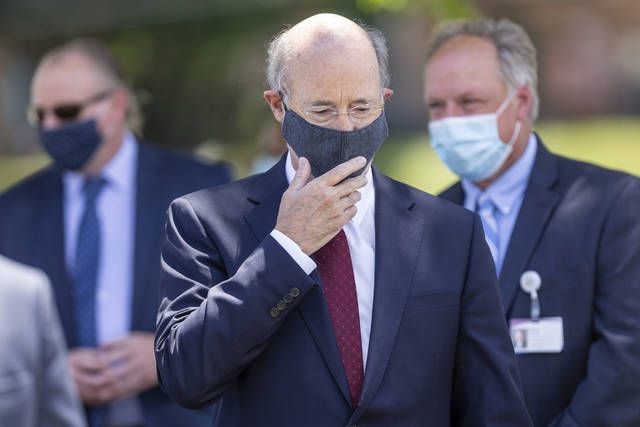
Pennsylvania Gov. Tom Wolf prepares to speak at a press conference outside UPMC Pinnacle Community Osteopathic Hospital in Lower Paxton Township on June 29.
Joe Hermitt | The Patriot-News via AP
Governor and health secretary amend COVID-19 serving, occupancy orders set to take effect Monday, Sept. 21
Click here to subscribe today or Login.
Last call in Pennsylvania will be later than previously announced under amended COVID-19 mitigation orders issued Thursday.
Gov. Tom Wolf and Health Secretary Dr. Rachel Levine approved regulations that will allow restaurants to serve alcohol for on-premises consumption up to 11 p.m. starting Monday, Sept. 21 — one hour later than the deadline previously set.
Under the amended orders, all alcoholic beverages must be removed from patrons by midnight.
These orders come as part of the administration’s decision allowing restaurants to increase indoor occupancy to 50% starting Monday.
The 11 p.m. cutoff applies to both restaurants that do not self-certify to increase to 50% and those that choose to stay at 25%, a statement from the governor’s office added. There is no change to the requirements for the temporary sale of cocktails-to-go and take out alcohol sales from bars, restaurants or hotels with a liquor license.
“As we continue to take critical steps to continue to mitigate the spread of COVID-19, we also recognize that this pandemic has taken a significant toll on the food services industry, so we must balance public health and economic recovery,” Wolf said. “These orders give restaurants the ability to increase indoor occupancy safely while giving customers confidence when deciding to patronize a restaurant.”
How to self-certify
The self-certification documents and information about the Open & Certified Pennsylvania program will be available online on Monday, Sept. 21, and will contain the following:
• A list of requirements contained in the current restaurant industry guidance and enforcement efforts
• A statement that the owner has reviewed and agrees to follow these requirements; The business’ maximum indoor occupancy number based on the fire code
• A statement that the owner understands that the certification is subject to penalties for unsworn falsification to authorities.
Restaurants should complete the online self-certification process by Oct. 5 when enforcement relative to 50% occupancy will begin, the governor’s office said. Self-certification will still be available after Oct. 5.
Restaurants that self-certify will appear in an Open & Certified Pennsylvania searchable online database of certified restaurants across the commonwealth and will receive Open & Certified Pennsylvania materials to display for customers and employees.
Business owners should keep a copy of the self-certification confirmation they will receive by e-mail, state officials said.
More information
The Wolf Administration has released:
• Frequently Asked Questions for restaurant owners and the public, at https://dced.pa.gov/wp-content/uploads/2020/09/Open-Certfied-Pennsylvania-FAQs.pdf.
• Updated restaurant guidance, at https://www.governor.pa.gov/covid-19/restaurant-industry-guidance/.
• Restaurant owners with additional questions about the self-certification program can contact [email protected].
Enforcement
The self-certification will be used as part of ongoing enforcement efforts conducted by Department of Agriculture and Pennsylvania State Police Bureau of Liquor Control Enforcement, and will be shared with the departments of State, Labor & Industry and Health, and other enforcement agencies, the governor’s office added.
“Self-certifying will not lead to additional inspections,” the statement released Thursday added.
“The occurrence of regularly scheduled or complaint-based inspections from enforcement agencies will not be affected by certification status. In fact, certifying proves that a business is committed to protecting employees and providing patrons a safe dining experience,” it continued. “Any health and safety violations from self-certified businesses will be handled first with warnings and education rather than fines or other penalties.”




